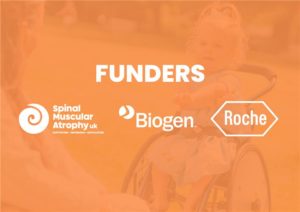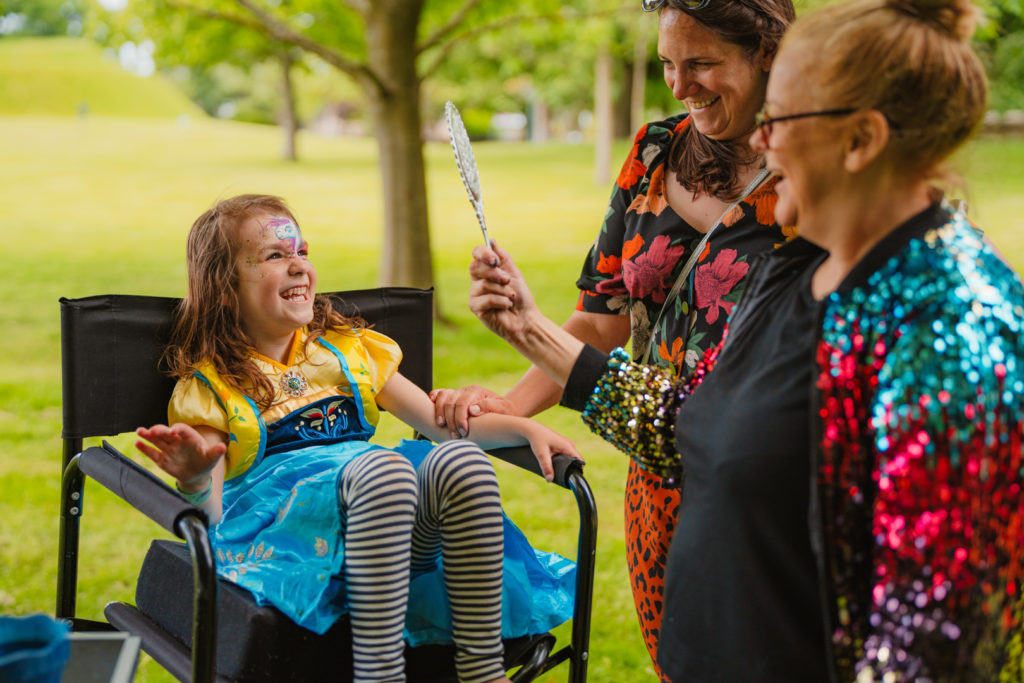SMA Care UK
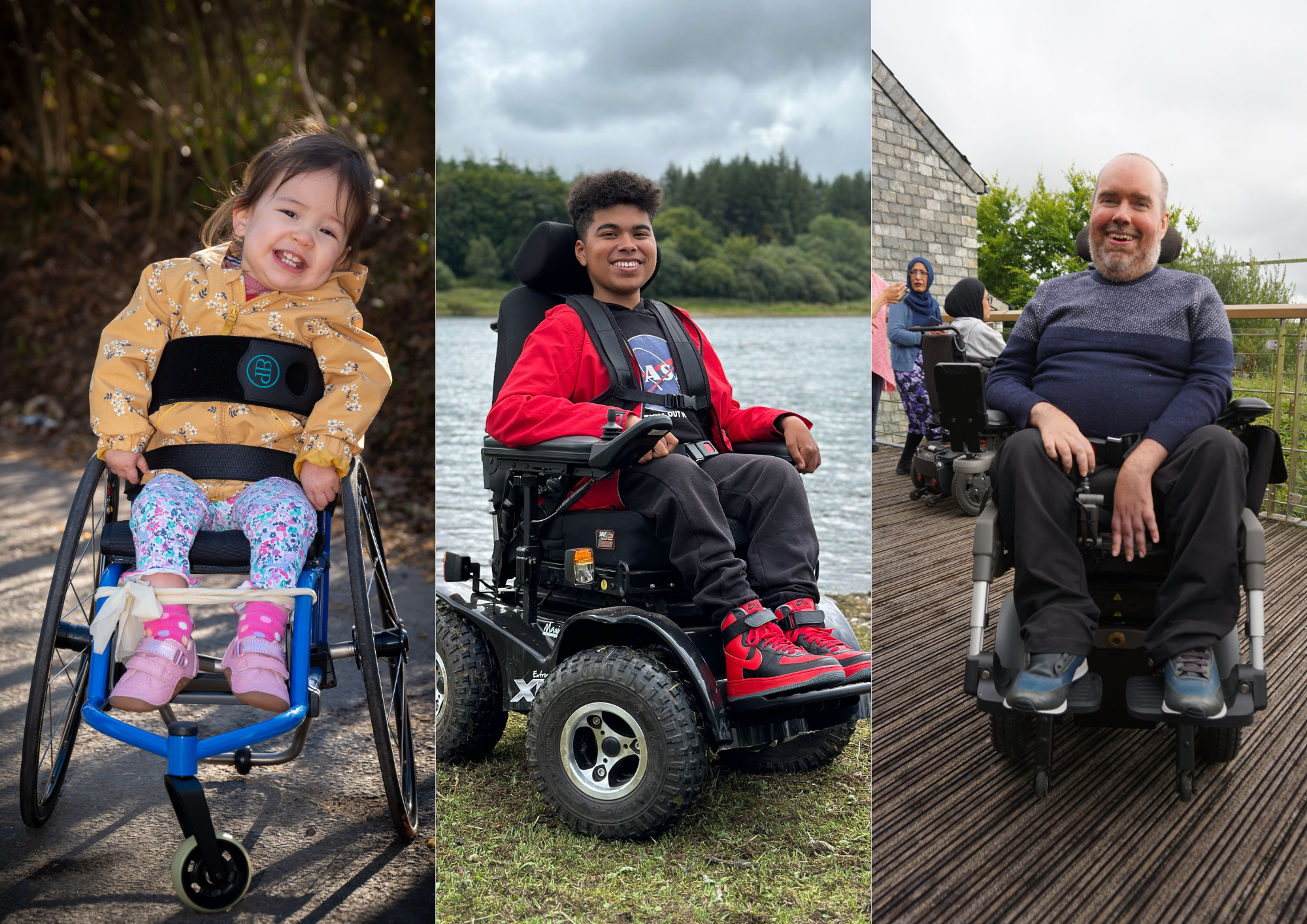
SMA Care UK
SMA Care UK is a 3 -year project established by clinicians and patient groups to update and implement UK Standards of Care for people of all ages living with SMA.
The current Standards of Care for SMA were written before disease-modifying treatments were only just beginning to emerge and were published in two articles in 2017. A Family Friendly Guide was published in the following year. They covered a wide range of topics such as nutrition and bone health through to respiratory care.
The new updated standards (SMA Care UK) will reflect how developments around treatments have changed the care and management needs of people of all ages living with SMA. Its goal is for this care to be accessible to all who have SMA, wherever they live and whichever hospital they attend. People living with SMA are central to this work. Given the wide-ranging impact of SMA, there are many areas of care to consider. Respiratory, hip, spine and transition to adult services will be the first topics to be reviewed.
 "After months of planning and working with a number of partners, clinicians and members of the SMA community we are delighted to formally launch the SMA Care UK project. It’s vital that the community help shape the new standards of care, and for that reason, we have created a new Facebook forum to discuss the key topics and issued face for each of the revised standards."
"After months of planning and working with a number of partners, clinicians and members of the SMA community we are delighted to formally launch the SMA Care UK project. It’s vital that the community help shape the new standards of care, and for that reason, we have created a new Facebook forum to discuss the key topics and issued face for each of the revised standards."
Giles Lomax, CEO
In this webinar, SMA UK’s Head of Advocacy and Community, Portia Thorman, talks to Kate and Connor, both members of the SMA community about the need for a revised standards of care document for SMA in the UK. They are joined by Vanessa Christie-Brown, project manager for SMA Care UK who is bringing together clinicians, researchers and the SMA Community to share practices, research and experiences to create this important document.
 Anne Marie Childs, Paediatric Consultant Neurologist and one of the two Principal Investigators of the SMA Care UK project said:
Anne Marie Childs, Paediatric Consultant Neurologist and one of the two Principal Investigators of the SMA Care UK project said:
"This discussion highlights the need for updated standards for the SMA community. Involving those living with SMA is crucial for the project. It will help set priorities, ensure the guidance is relevant, and empower people to get the best care."
The first Standards of Care (SoC) for spinal muscular atrophy (SMA) were written in 2007. In 2017 the standards were updated and revised. However, the authors (Mercuri E et al. 1 and Finkel R.S. et al2.) were aware that countries have different levels of resources, so made recommendations based on the minimal care and support that anyone with SMA should receive irrespective of country of residence. They also acknowledged that more specific work needed to be done to address the SoC for adults.
The publication of these guidelines was welcomed globally by the SMA community and a corresponding guide3 for people with SMA and their families was produced by clinicians, academics, health care professionals and patient representatives (Spinal Muscular Atrophy UK, Cure SMA, SMA Europe, Muscular Dystrophy UK and TREAT-NMD) and published in 2017.
However, these revised Standards of Care for SMA were written before disease-modifying treatments were beginning to emerge and were published in two articles in November 2017. A Family Friendly Guide was published in the following year. They covered a wide range of topics such as nutrition and bone health through to respiratory care.
SMA Care UK was born out of a need to update these 2017 SoC to reflect how developments around treatments have changed the care and management needs of people of all ages living with SMA. Its goal is for this care to be accessible to all who have SMA, wherever they live and whichever hospital they attend. People living with SMA will be central to this work. Given the wide-ranging impact of SMA, there are many areas of care to consider. Respiratory, hip, spine and transition to adult services will be the first topics to be reviewed.
 The methodology for SMA Care UK is based on the successful model established by DMD Care UK, which was launched in 2020 to improve care for all people living with Duchenne muscular dystrophy in the UK. Their project team has offered significant support and advice to SMA Care UK during our planning and set up, allowing us to benefit from the experience and learnings of DMD Care UK. Collaboration between the two projects will continue, in order to maximise benefits for the patient communities we serve.
The methodology for SMA Care UK is based on the successful model established by DMD Care UK, which was launched in 2020 to improve care for all people living with Duchenne muscular dystrophy in the UK. Their project team has offered significant support and advice to SMA Care UK during our planning and set up, allowing us to benefit from the experience and learnings of DMD Care UK. Collaboration between the two projects will continue, in order to maximise benefits for the patient communities we serve.
Read the latest news and updates about the SMA Care UK project:
19th June 2025: SMA Care UK – one year on. This report marks the end of the first year of the SMA Care UK project. Find out about progress made so far and how people with SMA are helping shape new guidelines across the UK.
14th May 2025: Bringing SMA Care UK into focus at the annual conference of British Neurologists.
Funders
We are extremely grateful to our funders who are supporting this project. Biogen, Roche and SMA UK have all committed funding towards SMA Care UK.
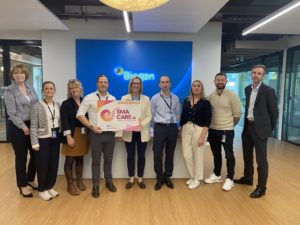

Partners
We are working with the following partners to bring this project to fruition:
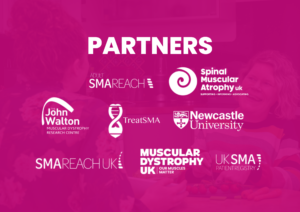
The team behind SMA Care UK
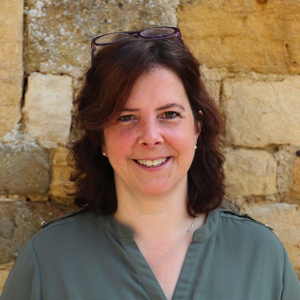 Vanessa Christie-Brown
Vanessa Christie-Brown
Project Manager
Vanessa was a research scientist, working in the field of immunology, initially at The Royal Postgraduate Medical School and later at Imperial College London. In 2011, she joined The SMA Trust as Research Coordinator and SMA Europe until 2024 as Research Programme Manager. In July 2024, Vanessa took up the post of SMA Care UK Project Manager, to drive forward the update and implementation of the Standards of Care for people of all ages who live with SMA in the UK. The initiative will address people’s evolving care and management needs, reflecting developments around treatments, ensuring that those living with SMA are central to this process.
She will work closely with the Principal Clinical Investigators:
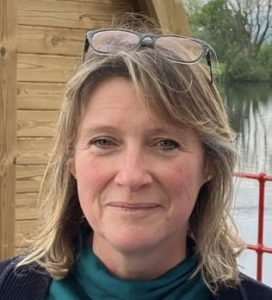 Dr Anne-Marie Childs
Dr Anne-Marie Childs
Principal Investigator
Anne-Marie is a Consultant Paediatric Neurologist and Lead for Neuromuscular Conditions at Leeds General Infirmary leading the neuromuscular service since 2000. She is a member of the SMA REACH network, clinical expert for NICE and NHSE and a trustee for SMA UK. She is committed to ensuring that those living with SMA in the UK receive the best possible care and delighted to be jointly leading this important project.
 Professor Chiara Marini-Bettolo
Professor Chiara Marini-Bettolo
Principal Investigator
Chiara is a Consultant in Neuromuscular disorders and the clinical lead for the Highly Specialised Service for Limb-girdle Muscular Dystrophies (LGMDs) at the John Walton Muscular Dystrophy Research Centre (JWMDRC), Translational and Clinical Research Institute, Newcastle University and Newcastle Hospitals NHS Foundation Trust, Newcastle upon Tyne, UK. As part of her clinical role, is committed to bring innovation and treatments to the diagnostic and clinical care service.
Chiara is also Honorary Professor in Neuromuscular disorders. She is Principal Investigator for Adult SMA REACH and the following patient registries: The UK SMA, UK FSHD, UK DM and MTM and CNM Patient registries which are all curated at The JWMDRC. Chiara’s research focuses on Real-world data and Patient reported outcome measures.
 Grecia Benesperi
Grecia Benesperi
SMA Care UK Coordinator
Grecia joined the John Walton Muscular Dystrophy Research Centre (JWMDRC) in July 2023, contributing to engagement events and administrative tasks. She assists with creation and maintenance of study documentation. She is responsible for organising Adult SMA REACH network activities and is main point of contact for stakeholders.
SMA Care UK Steering Committee
This group of healthcare professionals and patient representatives oversees the work of the team and sets priorities.
 Dr. Anne-Marie Childs
Dr. Anne-Marie Childs
Principal Investigator
Consultant Paediatric Neurologist and Lead for Neuromuscular Conditions at Leeds General Infirmary leading the neuromuscular service.
 Professor Chiara Marini-Bettolo
Professor Chiara Marini-Bettolo
Principal Investigator
Honorary Clinical Senior Lecturer and Consultant neurologist neuromuscular disorders at the Translational and Clinical Research Institute, Newcastle University and Newcastle Hospitals NHS Foundation Trust.
 Vanessa Christie-Brown
Vanessa Christie-Brown
Project Manager
Vanessa is the Project Manager based at SMA UK and Researcher at the Translational and Clinical Research Institute, Newcastle University.
 Grecia Benesperi
Grecia Benesperi
Project Coordinator
Grecia is the Project Coordinator and Project Assistant at Adult SMA Reach, based at the Translational and Clinical Research Institute, Newcastle University.
 Professor Giovanni Baranello
Professor Giovanni Baranello
Giovanni is Professor of Paediatric Neuromuscular Disorders at The Dubowitz Neuromuscular Centre, UCL Great Ormond Street Institute of Child Health, NIHR Great Ormond Street Hospital Biomedical Research Centre & Great Ormond Street Hospital NHS Foundation Trust in London.

Claire Fitzpatrick
Claire is a Senior Research Coordinator for the SMA Reach team at Great Ormond Street Hospital, London (GOSH).
 Dr. Channa Hewamadduma
Dr. Channa Hewamadduma
Channa is a consultant neurologist with specialist interest in neuromuscular disorders at Sheffield Teaching Hospitals Foundation Trust and an Honorary Senior Lecturer at the University of Sheffield.
 Dr Iain Horrocks
Dr Iain Horrocks
Iain is a Consultant Paediatric Neurologist at the Royal Hospital for Children in Glasgow.
 Dr. James Lilleker
Dr. James Lilleker
James is a Neurology Consultant and Honorary Senior Lecturer at the Manchester Centre for Clinical Neuroscience. He is co-chair of the Muscle Disease Unit, working in a joint neurology-rheumatology myositis clinic, and running the SMA assessment and treatment service for Greater Manchester.
 Giles Lomax
Giles Lomax
Giles joined SMA UK as CEO in May 2023 to lead the charity into its next phase.
 Grace Marston
Grace Marston
Grace is a Paediatric Neuromuscular Care Advisor at Nottingham’s Children Hospital.
 Dr. Robert Muni-Lofra
Dr. Robert Muni-Lofra
Robert is a Consultant Physiotherapist at the Newcastle University Translational and Clinical Research Institute.
 Neeru Naik
Neeru Naik
Neeru is the Director of Services and Support at Muscular Dystrophy UK.

Dr. Emer O’Reilly
Emer is a Clinical Research Physiotherapist in paediatric neuromuscular disorder at The Dubowitz Neuromuscular Centre, UCL Great Ormond Street Institute of Child Health, NIHR Great Ormond Street Hospital Biomedical Research Centre & Great Ormond Street Hospital NHS Foundation Trust in London.
 Dr. Mariacristina Scoto
Dr. Mariacristina Scoto
Mariacristina is a Consultant in Neuromuscular Translational Research at Great Ormond Street Hospital in London. She is principal investigator (PI) and co-PI of a number of clinical trials, in SMA and other neuromuscular conditions. She is Co-PI of the SMA REACH (SMA REsearch and Clinical Hub) UK Network. She sees the SMA Care UK project as an unique opportunity to bring clinical and patient experts together to develop targeted recommendations of care for the UK patients.
 Portia Thorman
Portia Thorman
Portia is Head of Advocacy and Community at SMA UK. She is the mother of four children, her youngest son, now six, lives with SMA Type 1.
 Andi Thornton
Andi Thornton
Andi is a Trustee of the charity Treat SMA.
Working groups (WGs)
These groups of healthcare professionals and patient representatives address each area of care. Five have been formed in the first instance: respiratory, hips, spine, transition to adult care and bone health. The composition of these groups can be found here.
Respiratory WG lead: Dr. Anne-Marie Childs.
Spine WG lead: Dr. Robert Muni-Lofra
Hips WG lead: Professor Giovanni Baranello
Transition WG lead: Professor Chiara Marini-Bettolo
Bone Health WG lead: Dr. James Lilleker
These are to:
- Review the International SoC (2017) with clinicians and patients to identify key aspects of care that require revision / update in light of the changing SMA landscape.
- Establish a UK SMA SoC consensus for each area of care.
- Implement and disseminate a UK minimum recommendation for each aspect of care.
- Address inequalities in care for families and adults between different sites across the UK by campaigning for this UK standard to be accessible to all people who have SMA, no matter where they live.
- Identify areas of care where further work / evidence / research is needed and work with SMA Europe and other international groups to develop new consensus statements for specific elements of care.
- Link with ongoing international initiatives to update the SoC recommendations based on the evolving therapeutic landscape.
Clinicians and patient groups who worked up the project proposal looked at the topics that had been covered in the 2017 Standards of Care (SoC). They then added to them to reflect the changes in treatment, care and awareness since this time. They came up with these focus areas (in alphabetical order):
- Cognitive and speech development
- including language and social communication.
- Emergency care
- Medication
- New and emerging therapies:
- SMN1 replacement
- SMN2 upregulation
- non SMN pathway myostatin inhibitors etc.
- Evidence reviews of repurposed drugs
- e.g., salbutamol and pyridostigmine
- Combination therapies
- Neurorehabilitation
- Nutrition, gastrointestinal and bone health
- Orthopaedic
- Spinal management
- Hip management
- Other organs – the impact of SMA
- Palliative care
- Physiotherapy
- including participation in activities of daily living
- Diagnosis
- newborn screening
- neonatal
- paediatric
- adults.
- Psychosocial care
- emotional, psychological & mental health support
- Reproductive health
- fertility
- pregnancy
- woman’s health
- men’s health (aspects of andrology).
- Respiratory care
- Acute care
- Symptom management
- Transition
It would be impossible to work on all of the focus areas at the same time and important that the project produces some meaningful outcomes within 2 years.
In May 2024, leading SMA clinicians across paediatric and adult specialist centres came together to decide which areas of care should be reviewed first. It was agreed that the first working groups selected had to be:
- Areas where there has been a significant amount of recent clinical research published, giving clear evidence.
- Areas that are a priority for both the SMA patient and clinical communities.
Following presentations from clinicians and SMA UK, as well as a poll on SMA UK’s what’s app groups, (see below), it was agreed that the first working groups would be:
- Hips (including monitoring and management)
- Breathing (Respiratory) – including acute care
- Transition into adulthood
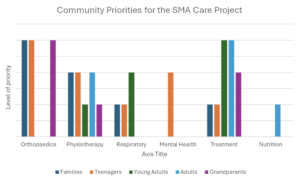
The short answer is, ‘Yes’. Clinicians and patients at the different Centres around the country are constantly discussing changing ideas and possible options.
We also know that the SMA Community is better connected than ever before and that many discussions are had and issues raised through social media and our virtual networks. SMA UK has therefore already been tapping into this to gather ‘patient perspectives’ on topics that will be covered by the project. This will save time for when those topics become the next focus:
SMA UK also works with other patient groups and clinicians when we consider an area of care needs urgent attention:
The Steering Group identifies experts to lead Working Groups (WG) for each area of care. With the support of the Project Manager, each Working Group:
- includes experts in that area of care from paediatric and adult SMA REACH centres, patient representatives and other relevant health care professionals
- identifies specific concerns and queries being raised by the patient and clinical community
- looks at the current recommendations and knowledge and review evidence, research and the results of any patient surveys/ consultation
- works to achieve consensus around best care practice
- produces draft guidance that will be reviewed by clinical networks, patients and relevant professional bodies before final agreement
- seeks endorsement for the new consensus guidance from relevant national/ international professional bodies to optimise adoption of a specific area of guidance across wider networks.
With the support of the Project Manager, each Working Group will:
- seek to publish guidelines in peer reviewed medical journals
- present guidance to relevant conferences and meetings to increase awareness.
- produce community focused information that is accessible to the SMA community, including leaflets and web pages.
- identify training needs and consider how to best deliver relevant teaching / information across all the targeted stakeholders (patients and families, clinicians, and industry), using existing resources when feasible.
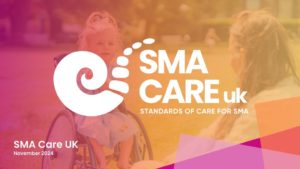 Join our Facebook Group to share your experiences for various working groups.
Join our Facebook Group to share your experiences for various working groups.
Alternatively, if you have particular experience in any of the proposed areas and would like to inform a working group, then please contact Vanessa Christie-Brown, project manager at:
- If you are someone living with SMA: vanessa.christie-brown@smauk.org.uk
- If you are a healthcare professional: Vanessa.Christie-Brown@newcastle.ac.uk
